Q&A with Ian Thorpe
Tell us about your current position.
I am an assistant professor in the department of chemistry and biochemistry at the University of Maryland, Baltimore County.
What are the key experiences and decisions you made that have helped you reach your current position?
I think the first key experience was the choice of my research focus during graduate school. I tried many different research experiences as an undergraduate at the University of Miami, trying to find the area of research that most appealed to me. Eventually, I worked with computational chemist Jeffrey Evanseck on obtaining a molecular model of human retinol binding protein. This is when it clicked for me and I realized that this was what I wanted to study in graduate school. With his help, I charted a course for graduate studies in this field and ultimately pursued my Ph.D. at the Scripps Research Institute. While there, I feel fortunate to have joined the group of Charles L. Brooks III, which provided an optimal environment to pursue my degree. My experiences in Dr. Brooks’ group solidified my love of research and were a significant factor in my choice to pursue an academic career. After receiving my Ph.D., I pursued postdoctoral studies with Dr. Greg Voth at the University of Utah. This was another pivotal decision, because I feel strongly that Dr. Voth’s advice and support played an important role in helping me to successfully pursue an academic career.

How did you first become interested in science?
I have always wanted to pursue a career in research and had an interest in science from an early age. This stemmed in part from my love of science fiction with its visions of future possibilities. I wanted to be able to play a role in making some of these visions reality. In particular, I was captivated by the idea of genetic engineering: altering organisms in ways that would allow them to do new and interesting things. Living organisms are exceedingly complex and it may be possible to harness some of this complexity to help solve many of the world’s problems including famine, disease and pollution. Now I work in the areas of computational chemistry and biophysics, with the goal of understanding how proteins function at a fundamental level. While my research is not directly involved in genetic engineering, some of the things we learn may be ultimately applicable to this field. It may be possible to design organisms to carry out different functions by modifying how their constituent proteins work.
Were there times when you failed at something you felt was critical to your path? If so, how did you regroup and get back on track?
I have had numerous setbacks along the way. However, I wouldn’t consider them failures, because in each case I learned something, kept trying and ultimately took something away from the experiences. Two that I remember most vividly are the rejection of my very first paper as a graduate student and my first grant application as a postdoctoral associate. In both cases, my writing was not well-suited to the requisite format and did not effectively communicate my ideas. This definitely impacted the ability of the reviewers to understand what was written. This situation became much more apparent in hindsight, but it helped to impress upon me the importance of developing strong skills in written communication.
What advice would you give to young persons from under-represented backgrounds who want to pursue a career in science similar to yours?
Find good mentors. These individuals can have a significant impact on your future success. It is not necessary to find someone who is from the same background: This can be quite difficult for someone from an under-represented group. However, it is important to talk to other people about the person you are considering to be your mentor. See what their experiences have been with this person. Everyone will have a different perspective, but by getting varied viewpoints you can put together a composite of what that person is like and determine whether they could be a good match. Finding a good mentor is a difficult process. Not everyone has the necessary qualifications, personality or desire to be a good mentor. If at first you don’t succeed at identifying someone appropriate, keep searching. The persons you identify may not end up being someone (such as your research adviser) who you might conventionally consider. Also be aware that it is not necessary for you to have one person who will fulfill all your mentoring needs. It may be necessary to identify several individuals who can assist you with different aspects of your personal or professional development.
What are your hobbies?
I like hiking, biking, going to movies and plays.
What was the last book you read?
It was probably the Lord of the Rings trilogy. However, this was quite a while ago!
Do you have any heroes, heroines or role models?
I have numerous role models and look to different individuals as archetypes for different things. For example, I might choose to emulate a peer because I admire the way they balance their personal and professional life or a senior scientist because of their research vision.
What is it that keeps you working hard and studying science every day?
I enjoy learning new things! I like making discoveries and identifying novel scientific insights. This is the driving force for much of what I do. In addition, I get a lot of satisfaction from working with students and being able to guide them as they pursue their own scientific careers.
Enjoy reading ASBMB Today?
Become a member to receive the print edition four times a year and the digital edition monthly.
Learn moreGet the latest from ASBMB Today
Enter your email address, and we’ll send you a weekly email with recent articles, interviews and more.
Latest in People
People highlights or most popular articles

Mining microbes for rare earth solutions
Joseph Cotruvo, Jr., will receive the ASBMB Mildred Cohn Young Investigator Award at the ASBMB Annual Meeting, March 7–10, just outside of Washington, D.C.

McKnight wins Lasker Award
He was honored at a gala in September and received a $250,000 honorarium.

Building a stronger future for research funding
Hear from Eric Gascho of the Coalition for Health Funding about federal public health investments, the value of collaboration and how scientists can help shape the future of research funding.

Fueling healthier aging, connecting metabolism stress and time
Biochemist Melanie McReynolds investigates how metabolism and stress shape the aging process. Her research on NAD+, a molecule central to cellular energy, reveals how maintaining its balance could promote healthier, longer lives.

Mapping proteins, one side chain at a time
Roland Dunbrack Jr. will receive the ASBMB DeLano Award for Computational Biosciences at the ASBMB Annual Meeting, March 7–10, just outside of Washington, D.C.

2026 voter guide
Learn about the candidates running for Treasurer-elect, Councilor and Nominating Committee.

